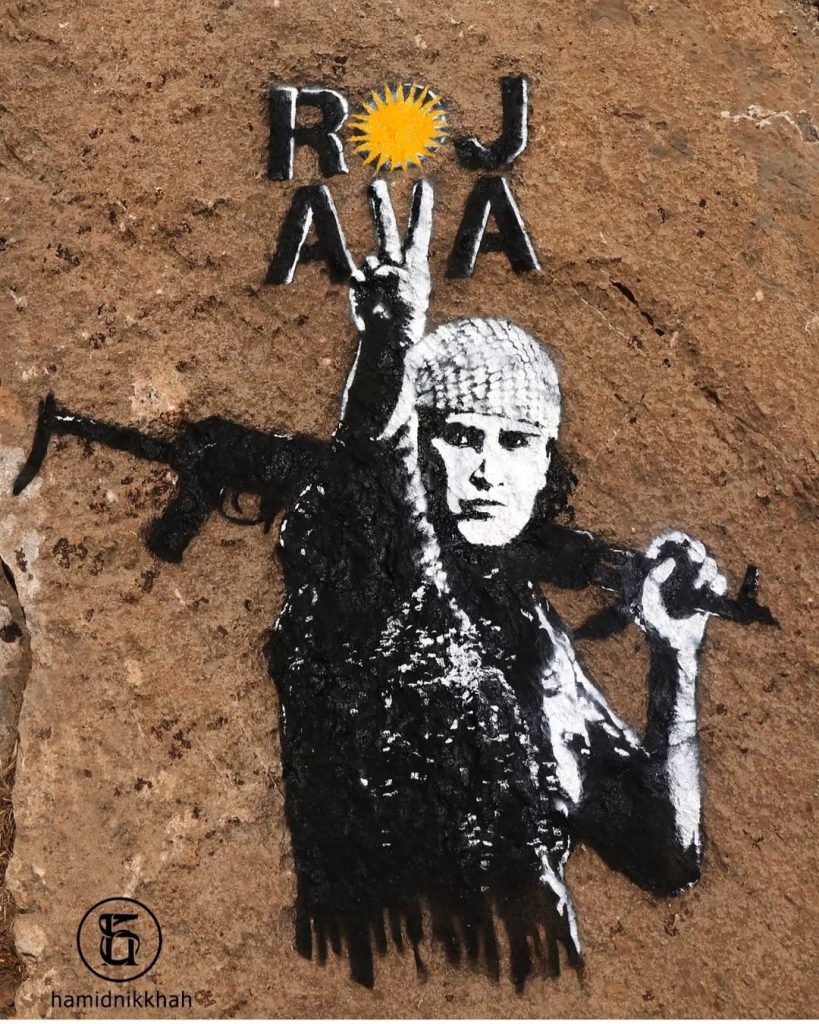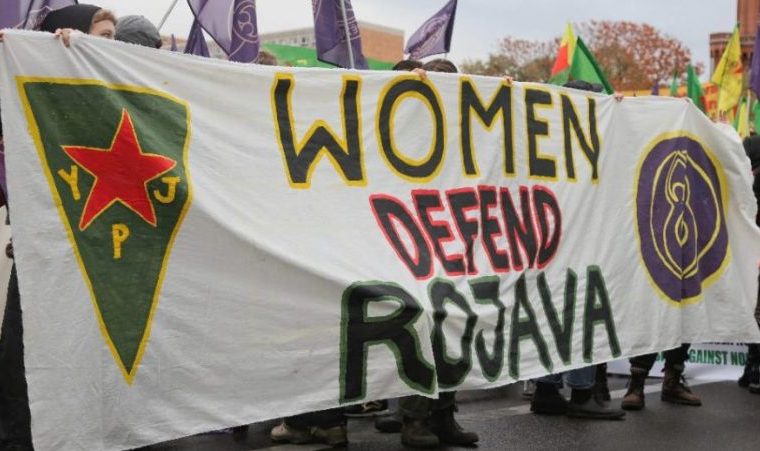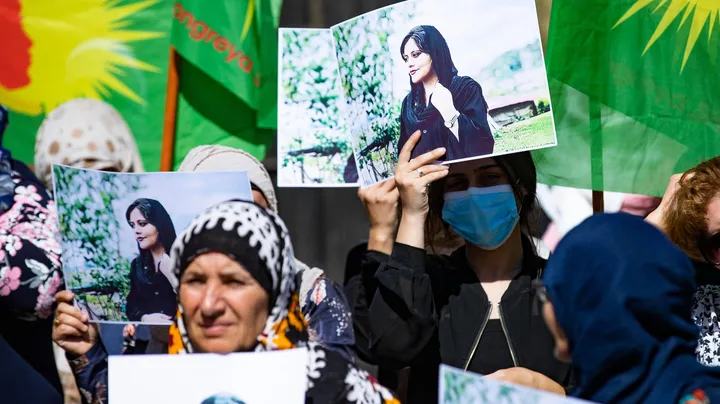

[Guhertoya Kurmancî]
Bi berdewamî bombebaranên asmanî û pêşveçûna bi rêya erdî ya hêzên îslamî-fondamentalîstên ku nîvîna dewleta Tirkiyeyê ne, ehtîmalek zêde yên heye ku di navbera DAIŞ û Rojava de disa şer dest pê dike. Yekîneyên Parastina Jin (YPJ) bi rûnberî hemû gelan û jinên cîhanî de daxwezî dikin ku: “Berî vê îhlanên, dengê xwe bilind bikin û berpîrsyarêtîya xwe li hemû cîhanê û le her derêkî xwe bigirin.”
Weşandina vê nivîsê, ku herî kêm pênc roj ji destpêkirina wê heye, îro di navberê vî bêdengîyê de bo em hemî herî girîngtir dibe. Dengek hêvî li ser birîyê çêdike û civakêkî biçukîn û daxwazek ji bo piştgirin:
Ketîna Asad û têkveçûna girtîgehan, ji çavkanîya kesên ku ji salan binerdahiya faşîzma Komara Îslamî û girtî û aşkence û darwekrînan dibîn u tecrube diken, bi rastî jî şa dibîn.
Lê, nirxandina şoreşa Îran ku di destpêkêda veguhêzîna ewlî ya ku wekî çarşikek “hezgir, navbirînî, bi tol û di ramanê de yê astengî hebe” dest pê kir û di demeke berfirehtî de bi qûl û tirkî û zordariya diguhêze, dîtina me bi karînêşxî xasî didike bi her mijarek binpêkirina xweparastîye îslamî hatiye qedandin. Ew jî nirxandin e ku ji destwerdanên vekolînê û binpêkirinên ku bihîstina gelên bi rastî şoreşger û lihevhatî ji hêzên hilbijartîya cîhanî nebirin, hêvîyek zêde nayê berhevkirin. Bi taybetî li cîhê di navbera pergalên hilbijartîya Îslamî û îslamîstin bilindî ne, û bi taybetî mafên stratejî ya dewletên herêmi û cîhanî parastîne. Em li dewleta Îsrail binêrn hevdem Bi qetlîama li Geze û Felestîn çewa li derfetêku çê boy li Surye bi kar hani u hêzên Leşkerîya xwê li ser çîyayên Golan û bombebaranên li tevahî Surye û herêmêku dixwazê hejmonîya xwê ser bê li Rojhîlatanavîn bi kar hanî, ev li demêkidaye ku ne bi şorîşêkî bi şêwazên Îranê û buhara Erebî, belku bi gihûrandîna rejîma otorîter bi destê çekdarên leşkerên îslamî bi dirûkêkî qirêj jî DAEŞê pêkhat û pêşîya meye. Li alîyêkî HTŞ bi pîştewanîya Turkîyê şerêk li ser sinurên Rêweberîya Xwê serê Rojhilat u Bakurê Surîye (Rojava) pêk hatîyê, Dewleta Turk ni tenê li hefteyên dawî belku bi salan û mehan bê navber hêrîşên serkutkarî li dijî ev Rêweberîyê xwê ser krîye, tundûtûjiya ku di vê rewşê de serdest dibe, me ji rewşa niha ya Surîye û li herêmê hestiyartir kiriye.
Beriya 45 salan, ku hîna gelek gelên Îranê di rewşeke şoreşgerî di bûn, ji rojên destpêkê yên damezrandina sîstema siyasî ya nû ve, tehdid krina jinan û bisinorkirina mafên wan ên bingehîn û tepeserkirina bi xwîna Îranê dest pê kiribû. Kurdistan (Rojhîlat) di heman serdemê de du salên pêşîn ên piştî şoreşa 57-an, cewhera dijberî ya kêmneteweyî û paşverû ya rejîma mêtînger û dije-jin a Komara Îslamî eşkere kir.
Niha ku zêdetirî du salan di ser serhildana ku bi dirûşma erênî ya “jin, jiyan, azadî” li seranserê Îranê belav bû re derbas bûne, tekane avahiya xwerêveberiyê ya ku bi rastî li herêmê heye, ku siyasetek alternatîf û pêşverû pêşkêş dike. Gotûbêja laîk û femînîst bi hurmeta hawirdorê radixe pêş çavan, her ku diçe bêhtir êrîş tê kirin, tê tepisandin û bêerdîkirin. Lê gelo mirov li hemberî zextên li ser Rojava bêdeng dimîne? Em ji nû ve zayîna tevgera siyasî ya van salan deyndarê dirûşme “Jin, Jian, Azadi” ne û li derveyî dirûşme “rûxandina rejîmê” li Rojhilata navîn a aloz, çavê me le vejîna azad û adilane ya hemî netewe, zayend, çîn, ziman û olên ne, çawa dikarin li hemberî tepeser kirina Rojava bêdeng bin?
Ji bîr nekin ku siberoja ronî ya herêmê bi milîtarîzekirina hêzên navendî, neteweperest, kolonyalîst, dij hindikayiyan, mêtingerî, dije-jin û paşverû derbas nabe. Ji bîr nekin ku siberoja ronî ya herêmê bi milîtarîzekirina hêzên navendî, neteweperest, kolonyalîst, dij hindikayiyan, mêtingerî, dije-jin û paşverû derbas nabe. Di dema ku destwerdana hikûmetên rojavayî, yên ku daxwazên penaberîyê yên Sûrî rawestand piştî ku hikûmeta Esed ket, û daxwaziya vegera wan – destwerdanên berjewendîparêz ên ku koçber û penaxwazan diafirînin û dixwazin vegerin – rojên serbilind û azad soz nade. Wek ku Dilar Dîrek, zanyarê komelnasiya siyasî ya Kurd, di vê dema şoreşê de daxuyaniya ku hemû mirov rolek di dîmenê xwe delîze, wî hat daxuyaniya ku: “Niha ji bo Kurdistan wê bibêje ‘desthilatî şoreşperî me bi kar bîne.’” Di vê demê de, ku dagirkerî, qirêjkirin, siyaseta astengîn, fermî û nasîonalîzmên komelî bi astengiyek û dinyayek bin bikiriştî di qedandinê de di dilê wan hêvîyek bi rabûye, şoreşa Rojava ev dem hatiye dayînê. Biji berxwedana Rojava!
— Aso Cewahêrî, Benefşê Rencî, Sara Kêrmaniyan, Sema Uryad, Şîrîn Asa, Leya Huşiyarî, Mehtab Mehbub, Nesteren Sarêmî, Halê Mîrmîrî û
Yeganê Xoyî
[English Version]
With the ongoing air and ground attacks by the Turkish government’s proxy fundamentalist forces, the likelihood of a more intense and comprehensive confrontation between ISIS and Rojava has resurged. Women’s Protection Units have clearly called upon all peoples and women of the world to “raise their voices against these attacks and fulfill their responsibilities.” Publishing this text feels more urgent than ever amidst the prevailing silence. It is a modest voice of solidarity and a call to join in.
The fall of Assad and the breaking of prisons—seen from the perspective of those who have long witnessed and experienced the Islamic Republic’s tyranny, prisons, torture, and executions—has undoubtedly been a source of joy. However, the experience of the 1979 Revolution and the transition, which initially seemed promising, tolerant, inclusive, and peaceful but quickly turned into rigidity, repression, and violence, has made us cautious about any victory of Islamism. Furthermore, such collapses, occurring in the absence of genuinely popular and revolutionary forces and without connections to other progressive international movements, leave little room for optimism—particularly in a region saturated with extremist and reactionary religious forces and governed by the strategic interests of regional and extra-regional powers. For example, we see how the Israeli state, while perpetrating genocide in Gaza and the West Bank, has exploited the current exceptional situation in Syria to extend its military arms to the Golan Heights, conduct arbitrary bombings across Syria, and expand its influence in the Middle East. All of this occurs while we are not facing a revolution in the style of Iran’s revolution or even revolutionary uprisings akin to the Arab Spring, but rather the overthrow of an authoritarian government by Islamist military rebels with an extremist background similar to ISIS. A battle is ongoing at the borders of the Autonomous Administration of North and East Syria (Rojava) while Hayat Tahrir al-Sham has taken over with the support from Turkey. Turkey’s government has persistently suppressed this autonomous administration not only in recent weeks but throughout past months and years. The violence that is taking place in this situation has made us increasingly sensitive to the unfolding events in Syria and the region.
More than 45 years ago, at a time when many people in Iran were still in revolutionary fervor, the suppression of women and the restriction of their fundamental rights began from the very first days of the new political system’s formation. Similarly, the bloody suppression of Iranian Kurdistan (Rojhelat) in the first two years after the 1979 revolution exposed the misogynistic, minority-oppressive, and reactionary nature of the Islamic Republic.
Now, more than two years after the uprising that swept through Iran with the affirmative slogan “Woman, Life, Freedom,” the only truly existing self-governing structure in the region—which presents an alternative politics and a progressive, secular, feminist discourse that respects the environment—is facing intensified attacks, suppression, and territorial dispossession. But can one remain silent in the face of the suppression of Rojava? How can we, who owe the rebirth of our recent political movement to “Jin, Jiyan, Azadi”, and who look beyond merely “overthrowing the system” for a future characterized by free and just life for all nations, genders, classes, languages, and religions in the tumultuous Middle East, remain silent in the face of Rojava’s suppression? It must not be forgotten that a bright future for the region cannot be achieved through the militarism of centralized, nationalist, colonialist, minority-oppressive, misogynistic, nature-destructive states. Nor can it emerge from the intervention of Western governments, who suspended Syrian refugees’ asylum requests as soon as Assad’s government fell and now await their return—opportunistic interventions that create refugees and displace them, only to demand their return.
Kurdish political sociologist Dilar Dirik has noted that everyone has a role to play, emphasizing that at this moment, “the fate of the Middle East is at stake.” In an era of occupation, genocide, tyranny, dominant ethnic nationalism, and political Islamism, any clear horizon for the peoples of the Middle East must emerge from solidarity with inclusive entities advocating for equality and freedom—entities that propose and experiment with alternative discourses and structures for life in the region. Rojava’s political existence is that unique, living experience before our eyes—a bright and inspiring fragment that calls our attention. May its resistance endure — Biji Berxwedana Rojava!
— Aso Javaheri, Banafsheh Ranji, Sara Kermanian, Sama Ooryad, Shirin Assa, Laya Hooshyari, Mahtab Mahboub, Nastaran Saremi, Haleh Mirmiri and Yeganeh Khoie
